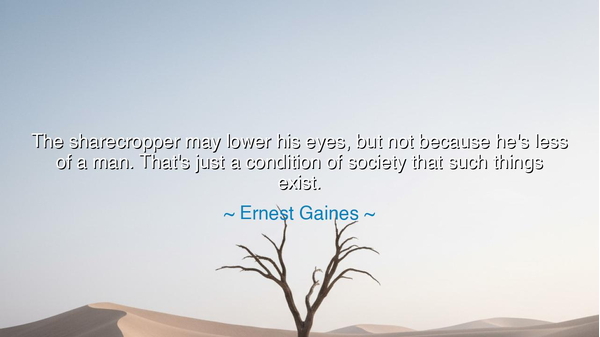
The sharecropper may lower his eyes, but not because he's less of
The sharecropper may lower his eyes, but not because he's less of a man. That's just a condition of society that such things exist.






"The sharecropper may lower his eyes, but not because he's less of a man. That's just a condition of society that such things exist." These words by Ernest Gaines carry a profound truth about the human condition and the oppressive nature of society. They speak not only to the injustice of the sharecropping system, but to the broader theme of how society often imposes conditions upon individuals that limit their freedom, dignity, and self-worth. The sharecropper—a man bound by the rigid constraints of poverty and the land—may lower his eyes in submission or humility, but this gesture is not a sign of his inferiority. It is a response to the circumstances of his life, the heavy burden placed upon him by a society that has stripped him of his autonomy. The lowering of his eyes is not a reflection of his humanity, but of the power dynamics that shape his world.
In the ancient world, the concept of power and oppression was ever-present. Consider the slaves of ancient Rome or the peasants bound to the land in medieval Europe. These individuals were often subjected to harsh conditions, stripped of their freedom and dignity, yet they were still human, still deserving of respect. Aristotle spoke of the natural order and the role of those who were born into servitude in his work Politics, yet even in his worldview, he recognized that those in subjugation could possess virtue and humanity. The ancient Greeks also had a sense of how society could shape the worth and perception of an individual. The glory of heroes such as Achilles or Hercules lay in their defiance against the limits of their worlds, yet the enslaved or the poor were often rendered invisible, their eyes lowered, not out of shame, but due to the weight of their circumstances.
Gaines’ words bring this timeless theme to the forefront, reminding us that the lowering of eyes is not a sign of moral failure or weakness, but a survival mechanism, a response to the oppressive forces that define one’s position in society. Sharecroppers in the American South, bound to the land and often working under the harshest conditions for meager wages, were not lesser men because of their circumstances. They were victims of a system that denied them opportunities for upward mobility, that told them their worth was tied to the land they worked and the sweat of their brow. This system, grounded in racism, economic inequality, and historical oppression, forced them to live lives of quiet dignity amid grinding hardship.
Consider the life of Rosa Parks, whose courageous act of defiance in Montgomery, Alabama, in 1955 challenged a society that had long relegated African Americans to the status of second-class citizens. Parks, a seamstress and a quiet member of the community, had been told for years by the social order to lower her eyes, to remain in her place, to accept the discrimination that defined her life. Her decision to stay seated on the bus that day was not just an act of rebellion; it was a demand for dignity, a refusal to accept that society could determine her worth based on the color of her skin. Parks’ eyes, that had once been lowered out of necessity, were now fixed on the future of freedom and equality. She showed the world that no matter the circumstance, the human spirit cannot be measured by the oppressive structures that bind it.
The message of Gaines’ quote is a call for us to reflect on the systems of oppression that exist in our own time. In a world where class, race, gender, and other markers are used to define a person’s worth, we must question the structures that perpetuate these inequalities. A society that demands individuals lower their eyes out of fear, shame, or submission is a society that stifles human potential. To lower one’s eyes in the face of such oppression is not a sign of failure, but an act of resilience, a defense against forces that seek to crush the human spirit. But we must also recognize that those who lower their eyes are not powerless; they are simply the victims of a world that has taught them their worth is tied to their circumstances.
The lesson that Gaines imparts is one of solidarity and justice. It is a call to recognize the inherent humanity of those whom society has pushed to the margins. It is a reminder that the true worth of a person lies not in the circumstances they are born into, but in their spirit, their resilience, and their capacity for dignity. We are called to stand alongside those who suffer under the weight of oppression and to challenge the systems that perpetuate these conditions. As individuals, we must refuse to allow the lowering of eyes to become the final statement of a person’s humanity.
In our own lives, let us take a stand for those whose eyes are lowered not out of a lack of worth, but because the world has made them believe their worth is bound to their station. Let us refuse to accept the systems that tell people they are less than they are, and let us seek to build a society where dignity, equality, and justice are the values that bind us all. As we work toward this vision, let us remember that no one is ever truly less of a man because of their circumstances, but only because society refuses to see them for their full humanity. Let us look into the eyes of others—not with pity, but with the understanding that they, like us, are worthy of a world where all can stand tall.






AAdministratorAdministrator
Welcome, honored guests. Please leave a comment, we will respond soon